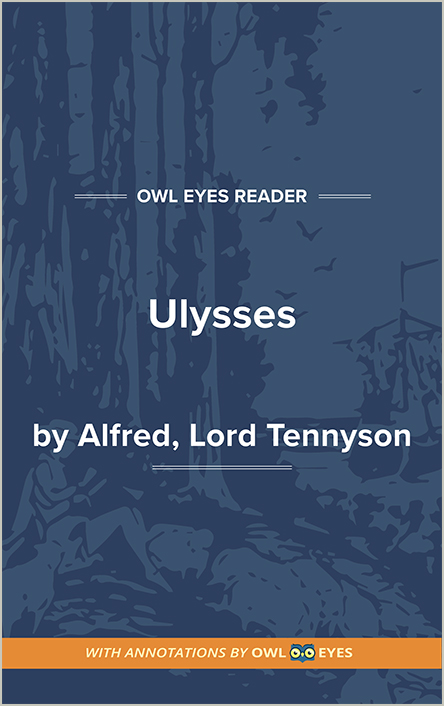Study Guide
Analysis Pages
Summary
“Ulysses” is ranked with several of Robert Browning’s dramatic monologues as the best in the genre. Based on a passage in Dante’s La divina commedia (c. 1320; The Divine Comedy, 1802), the poem depicts the hero of the Trojan Wars sometime after he has returned to his native land. Ironically, the man who had lived away from his beloved wife and son for ten years before the walls of Troy, and who had then wandered the Mediterranean for ten more as a result of a curse from the gods, is now displeased with the quiet life that he finds at home. The discomfort that Ulysses feels is emblematic of the dilemma that many of Tennyson’s contemporaries faced: whether to live life quietly, fulfilling one’s domestic duties, or to pursue some bold adventure. For Tennyson, the poem had personal significance as well: Written shortly after the death of his close friend Arthur Henry Hallam, it was the poet’s attempt to answer the question of whether to try to make a new life or to continue to wallow in his sorrow.
If one reads the poem in light of Tennyson’s personal comments, then the ending suggests a strong note of optimism. After convincing himself that he should not remain at home—his son, Telemachus, is more suited to rule a land where people have no aspirations for adventure—Ulysses summons a group of mariners to sail away with him to find new adventures. There is a recognized risk in such action: “It may be that the gulfs will wash us down,” he warns them, but if he and his men are fortunate, they may “touch the Happy Isles,/ And see the great Achilles that we knew.” Whatever they do, they will have the satisfaction of knowing that they have done their best in struggling against the elements (and old age) to make new reputations. The ringing final line, “To strive, to seek, to find, and not to yield,” becomes a battle cry for all who need support in their endeavors to make a better life.
Unfortunately, such a glib reading is not fully supported by internal evidence. The mariners whom Ulysses summons are not the same ones that sailed with him before; those men were all lost before the king returned to Ithaca. Further, his call to sail toward the west, and his remark that they may be fortunate enough to land in the Happy Isles, both suggest...
(The entire page is 602 words.)
Owl Eyes subscribers get unlimited access to our expert annotations, analyses, and study guides on your favorite texts. Master the classics for less than $5/month!

